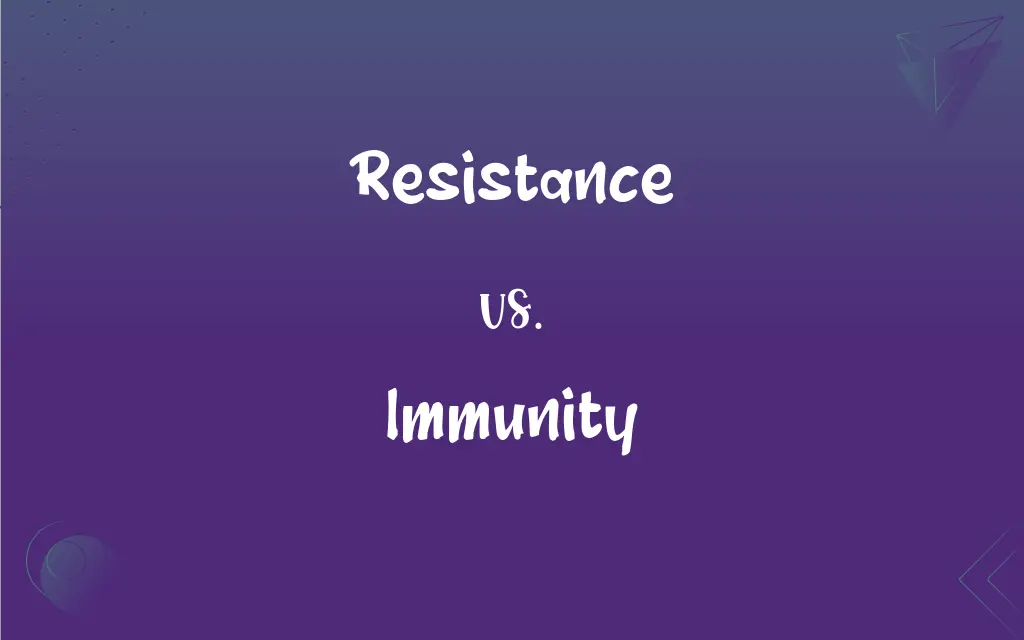Resistance vs. Immunity: What's the Difference?
Edited by Aimie Carlson || By Janet White || Updated on September 29, 2023
Resistance refers to the ability to fight off or withstand something, often partially or temporarily, while immunity implies a complete, often permanent, inability to get a specific disease or be affected by a particular agent.

Key Differences
Resistance is the ability of an organism to counteract the effects of an adverse agent partially or temporarily. Immunity, on the other hand, signifies a more complete protection against a particular agent, often permanent in nature.
In the context of diseases, resistance often means that an individual might still contract an illness but experience milder symptoms. Immunity, however, implies that the individual will not contract the disease at all.
The mechanisms behind resistance can be genetic, physiological, or developed through exposure. Immunity usually involves the immune system's specific response to a previously encountered pathogen, resulting in lasting protection.
In social and legal contexts, resistance refers to opposition against a force or system, whereas immunity refers to an exemption from certain laws or obligations.
While resistance often requires continuous exposure or effort to maintain, immunity is generally long-lasting and requires less maintenance.
ADVERTISEMENT
Comparison Chart
Meaning
Partial or temporary ability to withstand
Complete, often permanent, protection
Contexts
Biological, social, mechanical, electrical
Biological, legal
Nature
Partial or temporary
Complete and often permanent
Mechanism
Can be genetic, physiological, or acquired
Usually involves specific immune response
Maintenance
May require ongoing effort or exposure
Generally long-lasting, less maintenance
ADVERTISEMENT
Resistance and Immunity Definitions
Resistance
Opposition to a force or influence.
The resistance movement fought against the dictatorship.
Immunity
Protection against a specific disease.
Vaccination provides immunity against measles.
Resistance
The ability to withstand adverse conditions.
The plant shows resistance to drought.
Immunity
Legal exemption.
Diplomatic immunity protects ambassadors from prosecution.
Resistance
Psychological resilience.
His emotional resistance helped him during hard times.
Immunity
Psychological resilience.
Her mental immunity helped her cope with stress.
Resistance
The act or an instance of resisting or the capacity to resist.
Immunity
Social protection.
His popularity gave him a certain immunity in the community.
Resistance
A force that tends to oppose or retard motion.
Immunity
The quality or condition of being immune
“His above-average size during adolescence did not purchase immunity from the depredations of school bullies” (Stephen S. Hall).
Resistance
Often Resistance An underground organization engaged in a struggle for national liberation in a country under military or totalitarian occupation.
Immunity
(Immunology) Inherited, acquired, or induced resistance to infection by a specific pathogen.
Resistance
(Psychology) A process in which the ego opposes the conscious recall of anxiety-producing experiences.
Immunity
Exemption from certain generally applicable requirements of law or from certain liabilities, granted to special groups of people to facilitate the performance of their public functions
Diplomatic immunity.
Judicial immunity.
Resistance
Ability (of an organism, tissue, or cell) to withstand a destructive agent or condition such as a chemical compound, a disease agent, or an environmental stressor
Antibiotic resistance.
Resistance to fungal diseases.
Drought resistance.
Immunity
Exemption from prosecution granted to a witness to compel that witness to give potentially self-incriminating testimony that otherwise could not be compelled because of the constitutional right against self-incrimination.
Resistance
Lack of normal response to a biologically active compound such as a hormone
Insulin resistance.
Immunity
Exemption from being sued
Sovereign immunity.
Charitable immunity.
Resistance
(Electricity) The opposition of a body or substance to current passing through it, resulting in a change of electrical energy into heat or another form of energy.
Immunity
A condition conferred upon a contestant that prevents that contestant from being eliminated from a competition for a certain time period
The winner of the challenge was given immunity for the following challenge.
Resistance
Thermal resistance.
Immunity
(uncountable) The state of being insusceptible to something; notably:
Resistance
The act of resisting, or the capacity to resist.
Widespread resistance to the new urban development plans
The resistance of bacteria to certain antibiotics
Immunity
(medicine) protective resistance against disease.
Some people have better immunity to diseases than others.
Resistance
(physics) A force that tends to oppose motion.
Immunity
(law) An exemption from specified duties, such as payments or services.
Feudal privileges often included tax and other immunities.
Resistance
(physics) electrical resistance.
Immunity
(law) An exemption from prosecution.
The prosecutor offered the lieutenant immunity for all the crimes he would testify having known to be planned by the elusive drug baron.
Resistance
An underground organisation engaged in a struggle for liberation from forceful occupation; a resistance movement.
Immunity
(religion) An exemption from penance.
Resistance
The act of resisting; opposition, passive or active.
When King Demetrius saw that . . . no resistance was made against him, he sent away all his forces.
Immunity
(in games and competitions) An exemption given to a player from losing or being withdrawn from play.
After winning the last round the player was granted immunity which allowed him to stay in the game even after receiving the fewest points.
Resistance
The quality of not yielding to force or external pressure; that power of a body which acts in opposition to the impulse or pressure of another, or which prevents the effect of another power; as, the resistance of the air to a body passing through it; the resistance of a target to projectiles.
Immunity
(countable) A resistance to a specific thing.
Superbugs are bacteria that develop an immunity to antibiotics.
Resistance
A means or method of resisting; that which resists.
Unfold to us some warlike resistance.
Immunity
Freedom or exemption from any charge, duty, obligation, office, tax, imposition, penalty, or service; a particular privilege; as, the immunities of the free cities of Germany; the immunities of the clergy.
Resistance
A certain hindrance or opposition to the passage of an electrical current or discharge offered by conducting bodies. It bears an inverse relation to the conductivity, - good conductors having a small resistance, while poor conductors or insulators have a very high resistance. The unit of resistance is the ohm.
Immunity
Freedom; exemption; as, immunity from error.
Resistance
The action of opposing something that you disapprove or disagree with;
He encountered a general feeling of resistance from many citizens
Despite opposition from the newspapers he went ahead
Immunity
The state of being insusceptible to disease, certain poisons, etc.
Resistance
Any mechanical force that tends to retard or oppose motion
Immunity
The state of not being susceptible;
Unsusceptibility to rust
Resistance
A material's opposition to the flow of electric current; measured in ohms
Immunity
(medicine) the condition in which an organism can resist disease
Resistance
The military action of resisting the enemy's advance;
The enemy offered little resistance
Immunity
The quality of being unaffected by something;
Immunity to criticism
Resistance
(medicine) the condition in which an organism can resist disease
Immunity
An act exempting someone;
He was granted immunity from prosecution
Resistance
A secret group organized to overthrow a government or occupation force
Immunity
Resistance to a poison or toxin.
The king had immunity to the poison.
Resistance
The degree of unresponsiveness of a disease-causing microorganism to antibiotics or other drugs (as in penicillin-resistant bacteria)
Resistance
(psychiatry) an unwillingness to bring repressed feelings into conscious awareness
Resistance
An electrical device that resists the flow of electrical current
Resistance
Group action in opposition to those in power
Resistance
Electrical impedance.
This material has high electrical resistance.
Resistance
Reduced susceptibility to a drug.
The bacteria developed antibiotic resistance.
FAQs
What is immunity?
Immunity implies complete, often permanent, protection against a specific agent.
Can resistance turn into immunity?
Sometimes, but usually resistance offers only partial or temporary protection.
Is immunity always permanent?
Not necessarily; immunity can wane or be short-lived.
Is resistance always biological?
No, resistance can be mechanical, electrical, or even social.
What is resistance?
Resistance refers to the ability to fight off or withstand something.
Is immunity only biological?
No, immunity can also be legal, like diplomatic immunity.
Can you have resistance to stress?
Yes, psychological resistance to stress is possible.
How is immunity confirmed?
Immunity is often confirmed through tests measuring antibodies or protection against exposure.
Can immunity be artificially induced?
Yes, vaccines are a way to artificially induce immunity.
Is there such a thing as social immunity?
Social immunity can refer to a collective form of protection within a group.
Can animals have resistance and immunity?
Yes, animals can have both biological resistance and immunity to various agents.
Is immunity a right or a privilege?
Immunity is generally considered a biological feature, but in legal terms, it may be a privilege.
Can resistance be a bad thing?
Yes, like in the case of antibiotic resistance.
Is resistance always a conscious act?
No, resistance can be an unconscious biological function.
How is resistance measured?
Resistance can be quantified using various metrics, depending on the context.
About Author
Written by
Janet WhiteJanet White has been an esteemed writer and blogger for Difference Wiki. Holding a Master's degree in Science and Medical Journalism from the prestigious Boston University, she has consistently demonstrated her expertise and passion for her field. When she's not immersed in her work, Janet relishes her time exercising, delving into a good book, and cherishing moments with friends and family.
Edited by
Aimie CarlsonAimie Carlson, holding a master's degree in English literature, is a fervent English language enthusiast. She lends her writing talents to Difference Wiki, a prominent website that specializes in comparisons, offering readers insightful analyses that both captivate and inform.































































